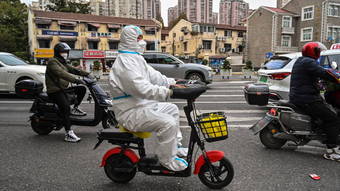China announced on Wednesday (7) a general easing of health rules to combat Covid-19 and abandoned the strategy of strict measures against the spread of the new coronavirus that led to the emergence of Historic wave of protests across the country🇧🇷
Anger over China’s “Covid-Zero” policy, which includes sudden lockdowns, constant testing and quarantining even of uninfected people, has led to demonstrations not seen since the 1989 pro-democracy movement.
The authorities tried to suppress the protests, but at the same time they began to respond to demands, first at the local level, and now at the national level.
New guidelines presented on Wednesday by the CNS (National Health Commission) in the Asian country indicate that the volume and scope of PCR tests (almost routine under Covid zero) will be reduced.
Lockdowns will also be eased and people with non-severe cases of Covid will be able to isolate themselves at home – rather than being sent to government facilities.
In addition, residents must not present a green health code on their mobile phones to enter buildings and public spaces, with the exception of “geriatric hospitals, medical institutions, day care centers, and secondary and higher education centers.”
The new rules state that “infected individuals who are asymptomatic or have mild cases and can self-isolate at home will generally self-isolate at home,” ending the requirement to quarantine in a government facility.
“Massive PCR tests will only be conducted in schools, hospitals, nursing homes and high-risk work units. The scope and frequency of PCR tests will be reduced,” the authorities added.
In addition, “people traveling between provinces must not present a test result within the past 48 hours and do not need to take the test on arrival.”
China will also speed up vaccination of the elderly population, which has long been seen as one of the main obstacles to easing the “Zero Covid” policy.
change of speech
Demonstrations against this restrictive Covid policy, implemented by the Communist Party, broke out across the country at the end of last month. Some have called for more political freedoms and even for President Xi Jinping to step down.
Since then, several Chinese cities have rolled back some of the tighter restrictions that have angered residents.
The capital, Beijing, where many businesses have already fully reopened, said this week that citizens should no longer test negative in the past 48 hours to use public transport.
Shanghai, which experienced a strict two-month lockdown earlier this year, announced similar measures and will allow its residents to enter open spaces such as parks and tourist attractions without a recent test.
Even the state-controlled media, which was full of grim news about the dangers of the virus and the devastation wrought in other countries, drastically reduced its coverage to play down the risks of infection.
The Omicron variant is mostly “not like last year’s delta variant,” said Zhong Yutian, a professor of medicine in an article published by the Chinese Communist Party-owned newspaper China Youth Daily.
“After being infected with the Omicron variant, the vast majority will have mild symptoms or no symptoms at all, and a few will develop severe symptoms,” he said.
But analysts from the Japanese company Nomura estimated, last Monday (5), that 53 cities in China, with a third of the local population, are still imposing restrictions.
Wednesday’s announcement came hours after the government released new figures showing the strong economic impact of the “Zero Covid” policy.
Chinese imports and exports fell in November to levels not seen since early 2020, when the pandemic brought the country to a standstill.
Imports fell 10.6% year-on-year through November, according to the General Administration of Customs. Exports fell by 8.7% in the same period.

“Music fanatic. Professional problem solver. Reader. Award-winning tv ninja.”


/https://i.s3.glbimg.com/v1/AUTH_bc8228b6673f488aa253bbcb03c80ec5/internal_photos/bs/2024/V/A/331F8qSPGcp8g41HUPAw/gettyimages-2150216534.jpg)




More Stories
The “Gate of Hell” in Turkmenistan was created by human error; The gap reaches more than 400 degrees – the world
Jalisi mocks the TikTok siege in the United States: “Defenders of freedom?”
It's #Fact: A three-meter-long crocodile was found between the tires of military aircraft and was captured in the United States of America; Video | Real or fake